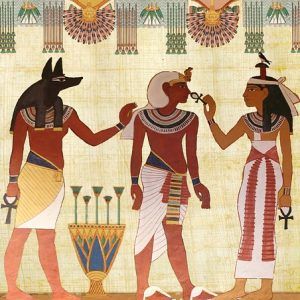In the North Eastern corner of Africa, an ancient civilization reached its golden age in the Middle Ages, but it dates as far back as centuries or even millennia before 1000 BC.
This civilization is better known as the Kingdom of Ethiopia, even though political changes after 1700 AD have seen it often labelled as Abyssinia.
The Egyptians recognized the lands south of their glorified realm – The Greater Ethiopia – as their ancient homeland. But they did not share the limelight in their time of world domination.
Ethiopia helped to found dynastic Egypt
In spite of the critical role of the Ethiopian highlands in sustaining the Nile plains, Ethiopia was only ever a subordinate to Egyptian ambitions.
In ancient times, the lands of Ethiopia were part of the greater Nubian zone. The White Nile in the East and the Blue Nile to the West defined this rough area.
Because of the critical role of the Nile waters to Egypt’s economy, ancient Egypt sought to bring Ethiopia under her influence early in the foundation era. Having won the loyalty of the numerous peoples living in the Nile catchment areas, Egypt was then able to stamp her authority in the region.
However, remarkably, Ethiopian royalty had equal rights to the throne of Egypt. In the pre-dynastic times of Egypt, Nubian kings ruled during the Naqadah III eras (3,800-3,000 BCE).
In the dynastic era of Egypt, they established an exclusive ruling class. Over her southern neighbours, the Egyptian gods of war prevailed.
The Nile connection
Egypt has always had to be very careful with her southern neighbours on account of her absolute reliance on flooding of the Nile. It is the only way to ensure the perennial floods that nourish the Nile valley are never obstructed.
The Blue Nile in Ethiopia supplies up to 80% of the Nile’s floodwaters. Its catchment, as such, has always been of paramount importance to Egypt. At the same time, Ethiopia is deeply attached to the sprawl of hills and mountains from which the Nile originates – their homeland.
Even in modern times, waters of the Nile are highly disputed. Both Egypt and Ethiopia rely on them for a host of economic activities, chiefly food and electricity production.
In ancient times, electricity production may not have been a concern, but irrigation definitely was. After all, the irrigation schemes of Egypt are legendary.
Along with numerous Egyptian trade expeditions to Ethiopia in ancient times, they also dispatched a fair number of military expeditions. They carried out some of these campaigns to quell Ethiopian ambitions over the waters of the Nile.
The economy of ancient Egypt continued to expand throughout her lifetime because the Nile floodwaters nourished the land every year. They widely practised agriculture for food production, as well as for other needs.
At the same time, Egypt kept Ethiopia isolated from the international trade that existed at the time. This allowed the pharaoh to maintain a strong hold over the region and further their interests over the region.
Also read: 4 Old Maps That Tell East African History Better
Trade beyond the land of Nubia
In this golden age of Egypt, Ethiopia was part of the larger territory of Nubia and was also known as Kush. It was the Greeks who renamed the Egyptian territories of Upper Nubia Ethiopia after the Roman conquest.
And even though Egypt isolated Ethiopia from international trade, she did not isolate her from the local one. In fact, Ethiopia may have played an important support role in supporting Egypt trade with the interior.
In the eighteenth dynasty of Egypt, Nubia underwent massive growth, leading to the formation of an elite ruling class. This elite class was able to exploit Ethiopia’s strategic location between Egypt and the East African interior.
They established a mercantile relationship, wherein Ethiopian traders helped Egypt to reach the gold, timber, and ivory produced in the great lakes region.
There is also evidence that Nubian merchants also travelled to the interior to acquire novelty items for sale in Egyptian markets. One item so unique it received special mention in a pharaoh’s commemorative stele was a pygmy captive they brought to court to entertain the pharaoh with his short legged dancing – no kidding.
Ethiopia definitely benefited from this relationship with Egypt. But Egypt benefited more, with proceeds from this trade helping her to build massive monuments that symbolize her fame.
Only when Egypt had long collapsed was Ethiopia able to conduct her own large scale trade expeditions to the South. These expeditions allowed Ethiopian kings to build numerous medieval infrastructures that dot Ethiopia today.
Egypt kept Ethiopia deliberately underdeveloped
To ensure Ethiopia would always be subject to Egyptian authority, the pharaohs sought to keep the region deliberately underdeveloped. This way, Ethiopian elites had no option but to patronize Egyptian temples.
Among the priestly class, Egypt was the capital of worship in the ancient world. Evidence points to Ethiopian priests serving in Egyptian temples along with the local and other foreign priests of Amun.
Lacking sufficient infrastructure to compete with Egypt's massive temple complexes, Ethiopians had no option but to subject to Egypt's gods.
But Egypt did not just under-develop Ethiopia religiously. Deliberate underdevelopment was economic as well. So, for example when they opened gneiss quarries, they always exported the stones back to Egypt.
In the economic exploitation of the lower lands, the superior Egyptian army was always at hand to ensure compliance on the part of Ethiopia. In this regard, Egypt was the playground bully, just taking what she pleased from her subjects.
For as long as Egypt was glorified on the world stage, her shadow fell on her southerly neighbour, Ethiopia, keeping her cut off from the rest of the world.
Opposition was futile on account of Egypt’s superior military. And the pharaohs were not shy to deploy their armies in their own backyards if the occasion called for it. All these factors conspired to keep Ethiopia subordinated to Egypt for more than a thousand years before the fall.
In the late dynastic period, however, winds of change were blowing over the Egyptian peninsula. The age of Ethiopia’s subservience to Egypt was gradually but surely drawing to a close.





